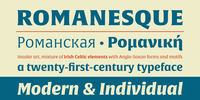Gerard Unger’s new typeface Alverata is a twenty-first-century type-face inspired by the shapes of Romanesque capitals in inscriptions of the eleventh and twelfth centuries, without being a close imitation of them.
It is additionally based on the early twentieth-century model, but tweaked so as to prevent blandness and monotony.
Alverata performs beautifully in both screen and on paper, delivering excellent legibility.
Its letters are open and friendly in small sizes and lively and attractive in large sizes. They are robust, and show refinement in their detail. More…
Unger’s Alverata is an extensive type family, with versions for both formal and informal applications, and with Greek and Cyrillic relatives.
Alverata consists of three different fonts: Alverata, Alverata Irregular and Alverata Informal, that vary in form and width, but maintain the same spirit.
The Irregular version is particularly inspired by the Insular letterforms, the uncials, and their constantly changing positioning.
Alverata strikes a balance among Europe’s diversity of languages, combining contemporary typographical practices with features of medieval letterforms, from the time when Europe came into being.
Visually, some written languages, such as Czech and Maltese, differ quite strongly from languages like English and German, notably because of their many accented characters.
While other typefaces will show this difference, Alverata removes it. As a result, Alverata enables harmonious convergence of languages.
For the development of the Greek letterforms, Unger collaborated with Gerry Leonidas (University of Reading) and Irene Vlachou (Athens), and with Tom Grace on the Cyrillic letterforms.
read more

Nessun commento:
Posta un commento